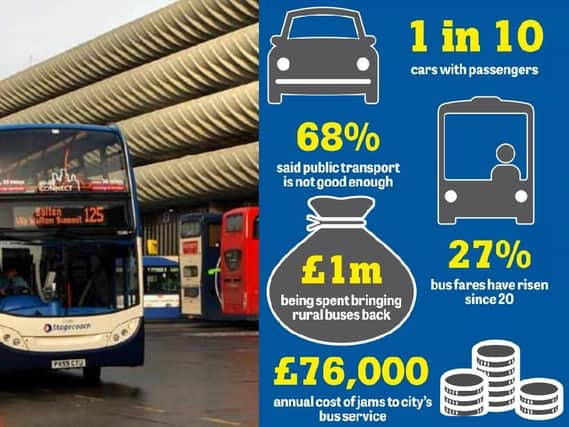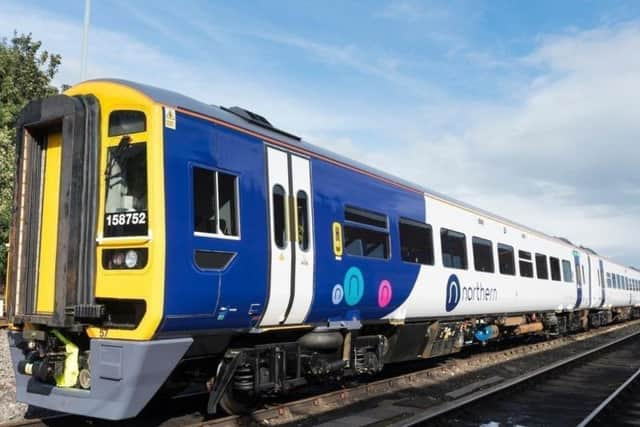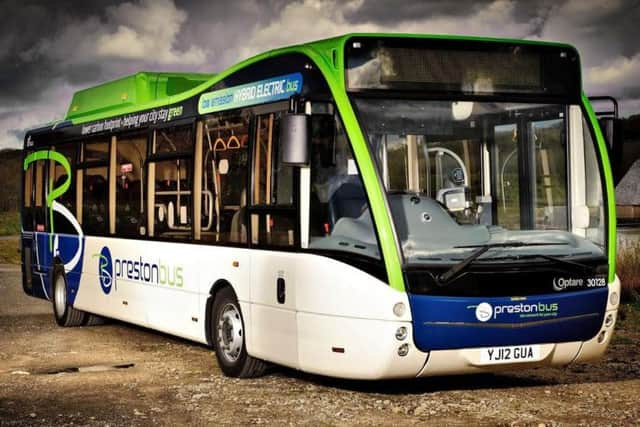Is Lancashire's public transport up to the job?


Yet they all shared one thing – congestion misery.


In the biggest survey we have ever carried out we asked readers what they thought of public transport in Preston and what would encourage them not to use their car and take a bus or a train instead?
The answers showed a general dissatisfaction with the services on offer in and around the city.
Advertisement
Hide AdAdvertisement
Hide AdOnly 31.93 per cent – less than one in three – rated public transport as good or very good. Exactly the same number said it was only average and slightly more graded it poor or very poor.
Significantly, four out of five people questioned said they found themselves stuck in traffic at least once a week in Preston – a staggering 53.31 per cent every day.


But when it came to telling us what would encourage you to use your car less in the city, 40 per cent said more convenient or frequent public transport services.
Around 35 per cent said cheaper public transport would make them think twice. And 18 per cent said absolutely nothing would change their mind.Amongst the comments readers made
Advertisement
Hide AdAdvertisement
Hide Adwere: “Bring back trams,” and “We need better bus links to the railway station.”
One said: “Give us safer public transport where you don’t feel intimidated.”


On the buses
Preston now has its own congestion charge caused by buses stuck in traffic.
Jams are costing the city’s bus service an extra £76,000 a year in running - or standing still - costs. And passengers are paying the price with fare rises to compensate.
Advertisement
Hide AdAdvertisement
Hide Ad“This is money spent on drivers and vehicles to simply sit in traffic,” said Thomas Calderbank of Preston Bus. “This cost has to be met by increasing fares, which we have reluctantly had to do recently.”


The bus company says it is having to use more drivers and vehicles just to maintain its timetable.
Last year the added cost was £54,000 and that has now risen to an estimated £76,000 solely to deal with congestion.
And, in addition to the extra crews, a bus station controller has had to be brought in just to regulate the delayed services.
Advertisement
Hide AdAdvertisement
Hide AdIn one example, nine buses were used on one afternoon route in Preston seven years ago. Now it needs 13 just to keep the same service running to time due to increased traffic hold-ups.
Congestion is now seen as a “huge threat” to the bus network across Lancashire, with Preston at the hub of it. Operators say it is difficult to provide a reliable service because of traffic “sporadically grinding to a halt.”
On another route in Preston drivers say average rush hour speeds are now down to six miles per hour.
And Preston Bus openly admits: “We acknowledge that we are not providing the level of service our customers deserve.”
Advertisement
Hide AdAdvertisement
Hide AdTo help improve traffic flow the company has called for “effective” parking enforcement on bus routes like Plungington Road to improve what it claims is “a shambles” leaving buses struggling to get round obstructions.
It wants the RealTime information service, which was scrapped due to cost, to be brought back.
It is also urging companies to stagger start and finish times for staff to minimise the “chaos” that unfolds as hundreds of car drivers leave work at the same time.
And the company says a huge housebuilding programme in the north of Preston is also “a cause for concern.”
Advertisement
Hide AdAdvertisement
Hide AdThe calls come as bus passenger numbers continue to fall right across Lancashire. The number of journeys taken on local buses has dropped by almost 16m in the past five years, according to figures released by the Labour group at County Hall.
The Tory-controlled authority recently announced a £1m project to bring back some rural bus services which were cut under Labour.
But, while more than twice as many passengers still use buses than trains, the journeys have fallen from 61.3m in 2009/10 to 45.5m in Lancashire last year – a drop in demand of around a quarter.
“Public transport has just deteriorated because there is no strategy for public transport to be given any form of priority,” said John Asquith, regional operations manager of Preston Bus.
Advertisement
Hide AdAdvertisement
Hide AdIn Blackpool journeys fell from 12.8m to 10m between 2009/10 and 2016/17. In Blackburn with Darwen it dropped from 4.9m to 3.8m – a 22 per cent fall in both areas. In Cumbria the numbers fell from 17.7m to 14.8m. Bus fares have also risen nationally by 27 per cent on average since 2010.
Preston Bus says congestion within Preston has increased substantially over the past five years, particularly in the last 12 to 18 months. And it is now the most significant threat to local bus services in the city.
“For a business of any size, an outlay of £76,000 per year to deal with congestion is a difficult pill to swallow,” said a spokesman. “For the company and our customers, there is no return on this investment.
“This is money spent on drivers and vehicles to simply sit in traffic, in order to maintain the same timetable that was operated only a few years ago at no additional cost.
Advertisement
Hide AdAdvertisement
Hide Ad“The simple cause of congestion in Preston is that there are too many vehicles on the roads. But there is no magic wand to wave.
“A significant amount of traffic in Preston is passing through, meaning that our city is not even benefiting from the costs these passers through inflict on us all.
“Effective parking enforcement of key routes 24/7 would send out a message that illegal parking is not tolerated. Currently, it is common knowledge there is no enforcement after 6pm and only very patchy coverage outside of the immediate city centre.
“This leads to buses being delayed trying to pass illegally parked cars, with routes reduced to a single lane and cars often parked illegally for hours with no enforcement activity. It is the company’s view that parking enforcement in Preston is a shambles.”
Preston bus troublespots
Advertisement
Hide AdAdvertisement
Hide Ad• Plungington Road/Adelphi Street – Illegal parking, sometimes with cars left for hours, means the road can become single lane and difficult for buses to negotiate.
• New Hall Lane to Farringdon Park – Congestion means average journey speeds can be as low as six mph.
• Pittman Way/Caxton Road, Fulwood – Hundreds of staff leaving businesses at exactly 5pm can mean total gridlock and delayed buses.
Off the rails
If it isn’t crowded trains, it’s no trains.
And being a traveller in Lancashire can sometimes send you right off the rails.
Advertisement
Hide AdAdvertisement
Hide AdPassengers who regularly use the Preston to Blackpool line are in the midst of their biggest upheaval in decades as the service is closed for 19 weeks for electrification work at a cost of millions.
Those who make the trip between Preston and Manchester might get trains, but they are invariably old “rattlers” and packed to the rafters.
And those who travel between Preston and London find themselves charged far more for a ticket than those who get on 25 miles further north at Lancaster.
Far from letting the train take the strain, the train often becomes the strain for journey-weary commuters.
Advertisement
Hide AdAdvertisement
Hide AdOne regular traveller between Preston and Manchester, the Post’s Jenny Simpson, said: “Standing room only is probably a good day as a commuter. There are days when the trains are so busy, you can’t even board at all.
“On one occasion, I remember a dozen people being turned away from a delayed, crammed Preston-bound service at Deansgate. I managed to squeeze aboard into a door-well along with a woman on crutches and her broken leg in a plaster cast.
“The guard didn’t even attempt to find the poor woman a seat in the jam-packed carriage, but just kept asking her to move her plaster-shod foot out of the doorway so the doors could shut.
“I’ve been travelling on these trains up to twice a week for two years now, and can honestly say I haven’t seen a single improvement. Over-crowding, unreliable services and eye-watering fares is what you get - and there are no season tickets available for part-time commuters, so we really get hit in our wallets.
Advertisement
Hide AdAdvertisement
Hide Ad“My heart sinks whenever Northern announce yet again that there will only be two carriages on a service instead of the expected four: you have to gear yourself up for a scrum just to get on the creaking, dirty, 40-year-old Pacers.
“I have no magic solution, but I do know what we have to put up with the North West is just not good enough. Any other European country would be embarrassed by it.
“The Government needs to fine operators who are providing a sub-standard service - and make it much easier to remove the franchise from repeat offenders.”
While 2017 has been a difficult year for Preston-Manchester passengers, 2018 is set to continue in the same vein.
Advertisement
Hide AdAdvertisement
Hide AdSections of the line are now subject to weekend closures while more work is done to bring it up to scratch, meaning travellers being ferried around on replacement buses. The work will go on until February 11.
Electrification work on the Preston to Blackpool line has been underway for the past eight weeks and will continue to cause disruption to rail travellers until late March.
A 17-mile journey which normally takes just 27 minutes has been lasting more than 80 minutes, leading to commuters being late for work and on-going travellers missing their connections.
Starting on November 11, the 19-week scheme is part of a wider £1bn project to deliver “cleaner, quieter and more reliable” services across the North West.
Advertisement
Hide AdAdvertisement
Hide AdThe Preston to Kirkham and Wesham stretch via Salwick will re-open on January 28, meaning trains will be able to get through to Lytham, St Annes, Blackpool Pleasure Beach and Blackpool South.
But the section from Kirkham to Blackpool North via Poulton and Layton will remain closed until March 25.
